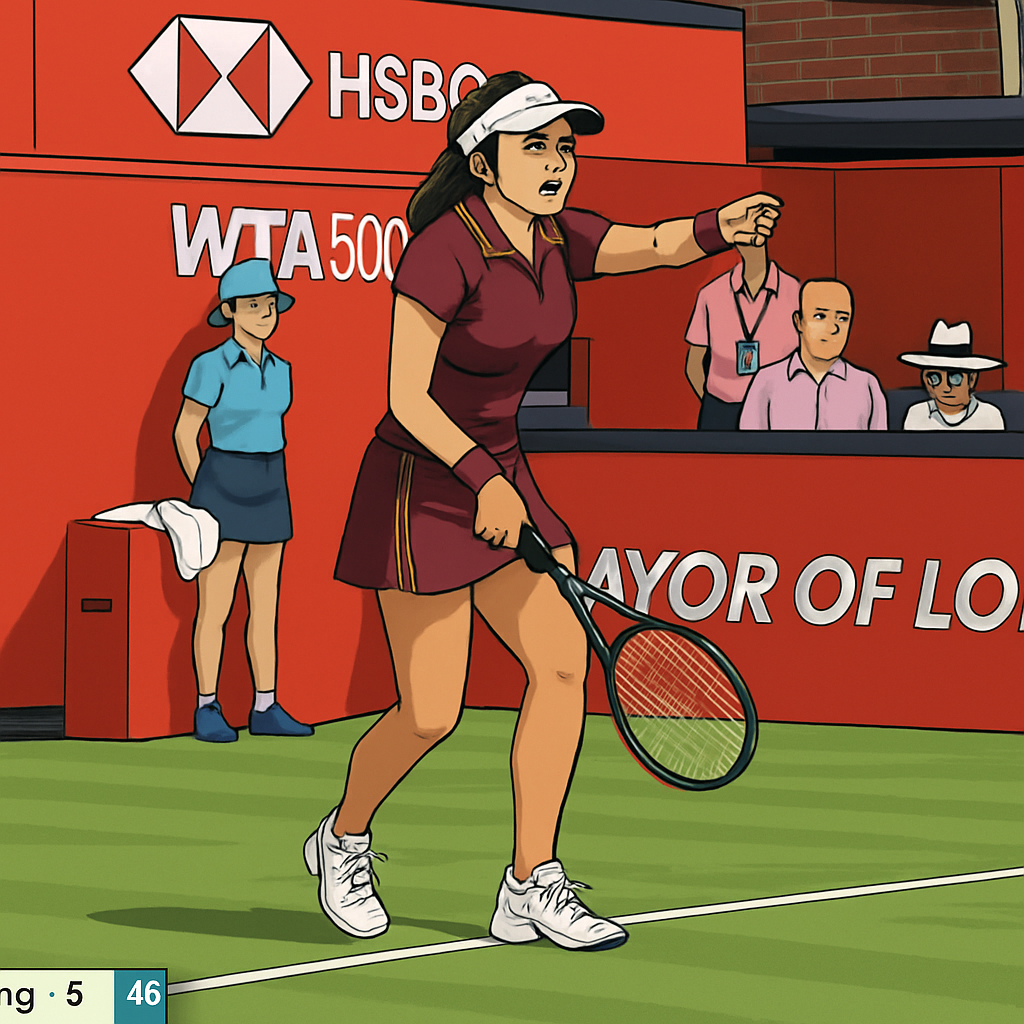LONDON — Emma Raducanu’s quarter-final clash with Qinwen Zheng at the prestigious Queen’s Club Championships took an unexpected turn as the British star found herself at the center of controversy after breaking an unwritten rule during a medical timeout delay, prompting boos from sections of the crowd.
Raducanu’s Rule Breach Sparks Backlash
The incident occurred during a tense second-set medical timeout requested by Zheng, who appeared to be struggling with an abdominal issue. While the Chinese player received treatment, Raducanu was seen practicing serves—a move that violated the sport’s informal etiquette of refraining from active play during an opponent’s injury break. The crowd, initially sympathetic to Zheng’s discomfort, turned restless, with audible boos directed at Raducanu.
Tennis analyst and former player Laura Robson weighed in on the controversy, stating, "It’s one of those unspoken rules—when your opponent is down, you don’t keep playing. Emma’s still learning the nuances of the tour, but this was a misstep." The backlash overshadowed what had been a fiercely contested match, with Raducanu eventually prevailing 6-2, 5-7, 6-1.
A Clash of Rising Stars
The match itself was a showcase of two of the sport’s most exciting young talents. Raducanu, the 2021 US Open champion, entered the tournament on a resurgent note after battling injuries and form struggles. Zheng, ranked No. 8 in the world, brought her trademark power and aggressive baseline game, making for a compelling contrast in styles.
Key moments from the match included:
- Raducanu’s dominant first set, where she broke Zheng twice
- Zheng’s gritty fightback in the second, capitalizing on Raducanu’s dip in consistency
- The decisive third set, where Raducanu regained control with precise shot-making
The Medical Timeout That Changed the Mood
At 4-3 in the second set, Zheng signaled for medical attention, clutching her side. As the trainer assessed her, Raducanu walked to the baseline and began serving practice—a move that drew immediate criticism. Veteran umpire Alison Hughes reportedly reminded Raducanu of the protocol, but the damage was done. Social media erupted, with fans divided over whether the reaction was justified.
Zheng later downplayed the incident, telling reporters, "I was focused on my pain. I didn’t see what Emma was doing. These things happen in matches—it’s part of competition." However, the optics were poor for Raducanu, who has faced scrutiny over her on-court demeanor in the past.
Raducanu’s Response and Aftermath
In her post-match press conference, Raducanu addressed the controversy: "I wasn’t aware it was frowned upon. My intention wasn’t to disrespect Qinwen—I was just trying to stay warm and focused. I’ll know better next time." The 21-year-old acknowledged the crowd’s reaction but insisted it didn’t affect her performance.
The incident reignited debates about tennis’s unwritten rules. While the sport’s official regulations don’t prohibit practicing during medical breaks, the tradition of respecting an opponent’s distress is deeply ingrained. Former Wimbledon champion Marion Bartoli noted, "It’s about sportsmanship. Even if it’s not illegal, it’s not the spirit of the game."
Looking Ahead for Both Players
Despite the drama, Raducanu advanced to the semi-finals, where she faced a tough test against Jessica Pegula. For Zheng, the abdominal issue raised concerns ahead of Wimbledon, though her team confirmed it was precautionary. Both players remain central figures in tennis’s next generation, with this match adding another chapter to their growing rivalry.
The Queen’s Club Championships, a key Wimbledon warm-up event, has often been a stage for emerging narratives. This year, Raducanu’s resurgence and the etiquette debate took center stage. As one tournament official remarked, "Emma’s talent is undeniable, but moments like these remind us that tennis is as much about character as it is about forehands."
For Raducanu, the incident may prove a learning experience. Her raw ability has never been in question, but navigating the sport’s subtleties—both on and off the court—remains a work in progress. As for the fans at Queen’s, their reaction underscored how deeply tennis values its traditions, even in an era of increasing professionalism.
The match will be remembered not just for its high-quality tennis but for the moment that tested Raducanu’s composure. In the end, she emerged victorious on the scoreboard, but the broader conversation about sportsmanship lingers—a reminder that in tennis, how you win can be as important as the win itself.

